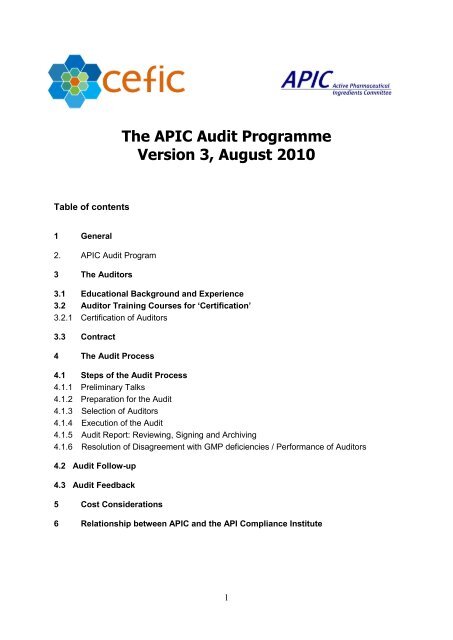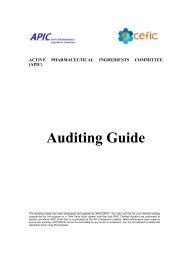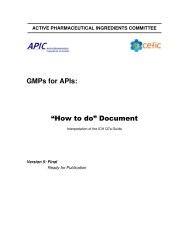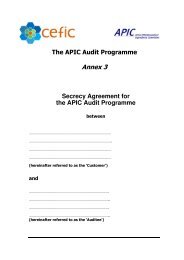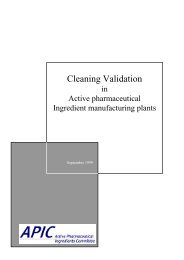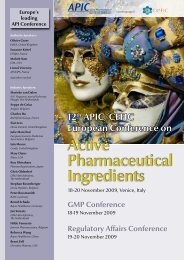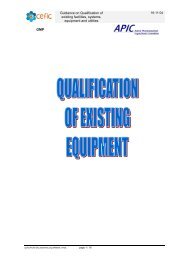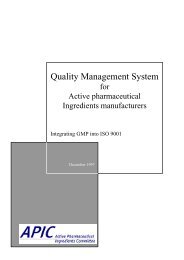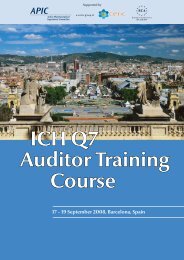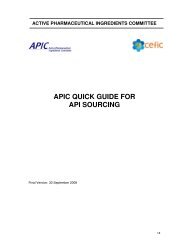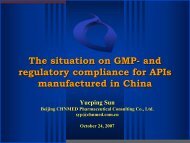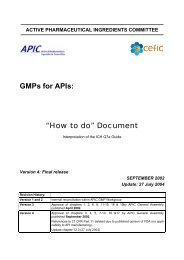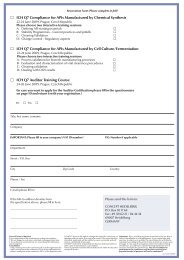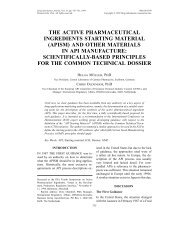The APIC Audit Programme - Active Pharmaceutical Ingredients ...
The APIC Audit Programme - Active Pharmaceutical Ingredients ...
The APIC Audit Programme - Active Pharmaceutical Ingredients ...
Create successful ePaper yourself
Turn your PDF publications into a flip-book with our unique Google optimized e-Paper software.
<strong>The</strong> <strong>APIC</strong> <strong>Audit</strong> <strong>Programme</strong><br />
Version 3, August 2010<br />
Table of contents<br />
1 General<br />
2. <strong>APIC</strong> <strong>Audit</strong> Program<br />
3 <strong>The</strong> <strong>Audit</strong>ors<br />
3.1 Educational Background and Experience<br />
3.2 <strong>Audit</strong>or Training Courses for ‘Certification’<br />
3.2.1 Certification of <strong>Audit</strong>ors<br />
3.3 Contract<br />
4 <strong>The</strong> <strong>Audit</strong> Process<br />
4.1 Steps of the <strong>Audit</strong> Process<br />
4.1.1 Preliminary Talks<br />
4.1.2 Preparation for the <strong>Audit</strong><br />
4.1.3 Selection of <strong>Audit</strong>ors<br />
4.1.4 Execution of the <strong>Audit</strong><br />
4.1.5 <strong>Audit</strong> Report: Reviewing, Signing and Archiving<br />
4.1.6 Resolution of Disagreement with GMP deficiencies / Performance of <strong>Audit</strong>ors<br />
4.2 <strong>Audit</strong> Follow-up<br />
4.3 <strong>Audit</strong> Feedback<br />
5 Cost Considerations<br />
6 Relationship between <strong>APIC</strong> and the API Compliance Institute<br />
1
Annexes<br />
Annex 1<br />
Annex 2<br />
Annex 3<br />
Annex 4<br />
Annex 5<br />
Contract between <strong>Audit</strong>or and the API Compliance Institute<br />
Agreement on <strong>Audit</strong> Execution between the Customer, <strong>Audit</strong>ee, <strong>Audit</strong>ors and<br />
API Compliance Institute<br />
<strong>APIC</strong> <strong>Audit</strong>ing Guide -Secrecy Agreement for <strong>APIC</strong> <strong>Audit</strong> <strong>Programme</strong><br />
Standardised letters relate to Shared Third Party <strong>Audit</strong>s<br />
Form to request feedback on <strong>Audit</strong> / <strong>Audit</strong>or performance from <strong>Audit</strong>ee.<br />
2
1 General<br />
According to the EU legislation „the holder of a manufacturing authorization shall at least be<br />
obliged to comply with the principles and guidelines of good manufacturing practice for<br />
medicinal products and to use as starting materials only active substances, which have been<br />
manufactured in accordance with the detailed guidelines on good manufacturing practice for<br />
starting materials‟ (Directive 2001/83/EC as amended, article 46(f) for Human Medicinal<br />
Products and Directive 2001/82/EC, Article 50(f) for Veterinary Medicinal Products).<br />
<strong>The</strong> Document entitled “Guidance on the occasions when it is appropriate for Competent<br />
Authorities to conduct inspections at the premises of manufacturers of active substances<br />
used as starting materials” (1) and the EMA Website GMP Question and Answers on audits<br />
of active substances manufacturers (http://www.ema.eu.int/Inspections/GMPfaqAS.html) give<br />
further guidance on what the European Authorities expect in terms of assessing the GMP<br />
status of active substance manufacturers.<br />
An audit conducted by or done on behalf of the Manufacturing Authorisation Holder<br />
(Manuf.Auth.Holder) of their <strong>Active</strong> <strong>Pharmaceutical</strong> Ingredient (API) Manufacturers /<br />
Suppliers should be an integral part of the Supplier Qualification Procedure of the<br />
Manuf.Auth.Holder.<br />
<strong>Audit</strong>s should be performed by qualified and trained staff, the audit should be properly<br />
documented and the audit reports will be subject to inspection by the Competent Authorities<br />
during inspections of the Manuf.Auth.Holder for the Medicinal Products.<br />
<strong>Audit</strong>s should be done periodically (every 2 to 3 years) to assess the continuing GMP<br />
Compliance status of the API Manufacturer and, as necessary, the Agent, Broker, Packer,<br />
Re-Packer, Distributor or Importer of the API.<br />
If a Third Party is involved then the Manuf.Auth.Holder as ”contract giver” should follow<br />
Chapter 7 of the EU GMP Guide and evaluate the Third Party auditors / audit process as the<br />
“contract acceptor” to ensure that the audit process complies with their GMP expectations.<br />
<strong>The</strong> Manuf. Auth. Holder should ensure there is no conflict of interest between the audit<br />
process, the auditors and the <strong>Audit</strong>ee.<br />
In view of the legal background and the GMP expectation of supplier evaluation by the<br />
authorities, the Qualified Person(s) or responsible person(s) of the Manuf.Auth.Holder is<br />
responsible to assure that the APIs used in Human and Veterinary Medicinal Product<br />
Manufacture are manufactured according to the EU GMP guidelines for APIs.<br />
Several <strong>Audit</strong> Options are acceptable to the European Authorities:<br />
‣ <strong>The</strong> Customer / Supplier <strong>Audit</strong> or Second Party <strong>Audit</strong> that would be performed by<br />
the Qualified <strong>Audit</strong>ors of the Manuf.Auth.Holder for each API Manufacturer.<br />
<strong>The</strong> audit may also be performed by the Qualified <strong>Audit</strong>ors of the Marketing Authorisation<br />
Holders, for example in the case where the Marketing Authorisation Holder is responsible for<br />
the Manufacture or Supply of the API and contracts out the manufacture of the Medicinal<br />
Product to the Manuf.Auth.Holder for the Medicinal Product). <strong>The</strong> audit report and findings<br />
should be reviewed by the Qualified Person(s) of the Manuf.Auth.Holder . In this case, the<br />
responsibilities for auditing of the API Manufacturer should be defined in the Technical<br />
Contract between the Marketing and Manufacturing Authorisation Holders.<br />
__________________________<br />
(1) <strong>The</strong> Guidance was published in „Compilation of Community Procedures on Inspections<br />
and Exchange of Information‟, http://www.ema.eu/Inspections/GMPCompproc.html<br />
3
‣ A Third Party <strong>Audit</strong> of the API Manufacturer performed on behalf of the Qualified<br />
Person(s) or responsible person(s) of the Manuf.Auth.Holder. <strong>The</strong> Qualified<br />
Person(s) or responsible person(s) of the Manuf.Auth.Holder (Contract Giver)<br />
confirms that the Third Party <strong>Audit</strong> Process provides an effective assessment of the<br />
GMP status of the API manufacturer and that the audit is performed by<br />
independent, qualified <strong>Audit</strong>ors with no conflict of interest.<br />
‣ Shared Third Party <strong>Audit</strong>s are acceptable to the European Authorities as long as<br />
the Qualified Person(s) ensures that the scope of the audit is applicable to each<br />
Medicinal Product that uses the API as Starting Material.<br />
A Third Party <strong>Audit</strong> can either be initiated by one or more Manufacturing<br />
Authorisation Holder(s) („called „customer‟) or by the API Manufacturer / Distributor /<br />
Broker / Importer/ Packer / Re-Packer itself (called „<strong>Audit</strong>ee‟).<br />
If the API Manufacturer / Distributor / Broker/ Importer/ Packer / Re-Packer initiates<br />
the audit, the purpose of the audit is a self assessment of the GMP status of the<br />
API Manufacturer.<br />
<strong>The</strong> API manufacturers may use such audit programmes beyond the EU QP<br />
requirements as part of their own API supplier qualification management.<br />
Guidance on Supplier Qualification and Management is given in the <strong>APIC</strong><br />
publication<br />
‣ In the opinion of the Ad Hoc GMP Inspection Services meeting of EU Inspectors<br />
organized by EMA, the Manufacturing Authorisation Holders should decide for<br />
themselves whether there are any conflict of interest issues with any Third Party<br />
<strong>Audit</strong> Option.<br />
2 <strong>APIC</strong> <strong>Audit</strong> Program<br />
<strong>The</strong> approach taken by many Medicinal Product Manufacturers towards this legal<br />
requirement is to perform one to one audits of their API manufacturers. However it is<br />
recognised that audits are time-consuming and expensive for both the API and Medicinal<br />
Product Manufacturer and there is potential for significant audit overload for the<br />
<strong>Pharmaceutical</strong> Industry if this is the only option used.<br />
<strong>The</strong> aim of the <strong>APIC</strong> <strong>Audit</strong> <strong>Programme</strong> is to provide a standardised Third Party <strong>Audit</strong>ing<br />
process to ensure that an effective assessment is performed of the GMP status of APIs used<br />
as Starting Materials for Medicinal Products sold within Europe and in so doing contribute to<br />
the assurance of the Quality, Safety and Efficacy of the Medicinal Products.<br />
<strong>The</strong> API Compliance Institute as a Business Unit of Concept Heidelberg has been contracted<br />
by <strong>APIC</strong> to administer the <strong>APIC</strong> <strong>Audit</strong> <strong>Programme</strong>.<br />
<strong>The</strong> audits within the framework of the <strong>APIC</strong> <strong>Audit</strong> <strong>Programme</strong> are conducted by <strong>APIC</strong><br />
Certified <strong>Audit</strong>ors and standardised reports with classification of findings are issued.<br />
Third Party <strong>Audit</strong>s should be initiated by the Marketing Authorisation Holder for the Medicinal<br />
product according with the European directive 2001/83/EC and its amendments where it is<br />
defined that is the responsibility of the Manuf. Auth. Holder to assure that the API is<br />
manufactured in accordance with the cGMPs in force.<br />
In the case that several Manuf. Auth. Holders wish to cooperate on an audit of the same API<br />
Manufacturer or share an audit report the „Third party audit‟ becomes a ‘Shared Third Party<br />
<strong>Audit</strong>’.<br />
4
Once the initial request to arrange the audit has been made to <strong>The</strong> API Compliance Institute<br />
,other potential customers for the 3 rd Party <strong>Audit</strong> could be contacted using the Standardized<br />
letter (Annex 4) and if they wish to share in this audit, they should contact the API<br />
Compliance Institute within 1 month.<br />
In the case that a Third Party <strong>Audit</strong> has recently been performed and the API Manufacturer is<br />
contacted by a QP or responsible person of another Manuf. Auth. Holder who is interested in<br />
assessing whether this Third Party <strong>Audit</strong> Report satisfies their requirements, the<br />
representative of the Manuf. Auth. Holder should be asked to contact the API Compliance<br />
Institute. This scheme can also be applied to non EU Manuf. Auth. Holders.<br />
In the case that the API Manufacturer, / Distributor / Broker/ Importer / Packer / Re-Packer<br />
initiates the request for a Third Party audit of their Manufacturing Site, the audit will be for the<br />
purpose of performing a self-assessment audit. This will be documented in the <strong>Audit</strong><br />
Agreement and included as a Footnote in the <strong>Audit</strong> Report.<br />
Important:<br />
<strong>The</strong> „Compliance Triangle principle‟ (see figure 1) will be followed at all steps of the audit<br />
process to ensure that all parties involved - the „customer‟, the „<strong>Audit</strong>ee‟, the auditors and<br />
the API Compliance Institute as the coordinator of the audit are involved in the<br />
communication processes.<br />
.<br />
Figure 1:<br />
Compliance Triangle Principle of the <strong>APIC</strong> Third Party <strong>Audit</strong> <strong>Programme</strong><br />
<strong>Audit</strong>ors<br />
ACI<br />
<strong>Audit</strong>ee<br />
QP(s) or responsible<br />
person(s) of<br />
Manuf.Auth. Holder(s)<br />
Request by the QP(s) or Responsible Person(s) of the Manufacturing Authorisation<br />
Holder(s): Third Party <strong>Audit</strong> of API Starting Material used in Medicinal Products<br />
Request by the API Manufacturer / Distributor / Broker/ Importer/ Packer / Re-Packer: Self<br />
Assessment <strong>Audit</strong> of GMP status<br />
ACI = API Compliance Institute<br />
<strong>Audit</strong>ee = API Manufacturer / Distributor / Broker/ Importer/ Packer / Re-Packer<br />
QP = Qualified Person<br />
Manuf.Auth.Holder = Manufacturing Authorisation Holder for Human or Veterinary<br />
Medicinal Products.<br />
Participation in the <strong>APIC</strong> <strong>Audit</strong> <strong>Programme</strong> is on a voluntary basis and is not limited to<br />
members of <strong>APIC</strong> nor to a specific region of the world.<br />
<strong>The</strong> CEFIC <strong>APIC</strong> <strong>Audit</strong>ing Guide documentation<br />
(http://www.apic.cefic.org/pub/<strong>Audit</strong>ing/<strong>Audit</strong>ing%20Guide%20Final.pdf ) provides the<br />
5
framework for the standardised audit programme. Trained <strong>Audit</strong>ors follow the principles<br />
defined in the <strong>Audit</strong>ing Guide, to ensure that a comprehensive assessment of the GMP<br />
status of each API Manufacturer or as necessary Distributor, Trader, Broker, Importer,<br />
Packager, Re-packager of the API is performed and that full documentation is available to<br />
describe the audit.<br />
<strong>The</strong> audit report will include descriptions of all subjects covered during the audit, objective<br />
evidence for any GMP deficiencies found during the audit will be included in the report and<br />
such deficiencies will be classified by the <strong>Audit</strong>ors in one of the following categories<br />
(classification rating) that are based on the definitions included in the EMA GMP Inspection<br />
Report Format<br />
http://www.ema.europa.eu/Inspections/GMPCompproc.html<br />
Critical Deficiency:<br />
A deficiency which has produced, or leads to a significant risk of producing an <strong>Active</strong><br />
<strong>Pharmaceutical</strong> Ingredient that could be harmful to the human or veterinary patient.<br />
Major Deficiency:<br />
A non critical deficiency which has produced or may produce a product, which does not<br />
comply with its marketing authorization or which indicates a major deviation from EU Good<br />
Manufacturing Practice, or a combination of several “other” deficiencies, none of which on<br />
their own may be major, but which may together represent a major deficiency and should<br />
be explained and reported as such<br />
.<br />
Other Deficiency:<br />
A deficiency, which cannot be classified as either critical or major, but which indicates a<br />
departure from good manufacturing practice.<br />
(A deficiency may be “other” either because it is judged as minor, or because there is<br />
insufficient information to classify it as a major or critical).<br />
3 <strong>The</strong> <strong>Audit</strong>ors<br />
3.1. Educational Background and Experience<br />
<strong>The</strong> <strong>Audit</strong>ors should have a good educational knowledge of chemistry.<br />
Qualifications as Pharmacist, Medical Doctor, Chemical Engineer, graduate or<br />
Ph.D. in Chemistry, Biology or related fields as Agrochemistry etc., are appropriate.<br />
A good understanding of biochemistry and analytical techniques and practices is a<br />
definite advantage.<br />
At least 5 years practical experience of GMP manufacture of <strong>Active</strong> <strong>Pharmaceutical</strong><br />
<strong>Ingredients</strong> may also be considered as sufficient knowledge and background.<br />
With the exception of Pharmacists whose university courses may include modules<br />
on GMP Regulations, a good knowledge of applicable regulations is usually<br />
obtained through training and experience.<br />
6
3.2 <strong>Audit</strong>or Training Courses for ‘Certification’<br />
Attendance at a specific five-day training course sponsored by <strong>APIC</strong> (two and a half<br />
days related to GMPs in API manufacture and two and a half days for training in<br />
effective auditing techniques) is a prerequisite for becoming an <strong>APIC</strong> Certified<br />
<strong>Audit</strong>or. <strong>The</strong> participant will receive a certificate of attendance for each of the two<br />
training courses.<br />
<strong>The</strong> seminar fees will be charged directly to the <strong>Audit</strong>or or his company.<br />
3.2.1 Certification of <strong>Audit</strong>ors<br />
In order to become an <strong>APIC</strong> Certified <strong>Audit</strong>or, the <strong>Audit</strong>or has to undergo an<br />
examination. This examination consists of 2 parts.<br />
Part 1: <strong>The</strong> participant has to take a written exam on the contents of the GMPcompliant<br />
manufacture of APIs in accordance with ICH Q7. This written exam is<br />
created by <strong>APIC</strong> in co-operation with the API Compliance Institute. After the training<br />
course, the participant is given access to a total of 30 questions via the Internet.<br />
<strong>The</strong>se have to be answered following the multiple-choice procedure. For this task,<br />
the participant has 60 minutes. He/she has passed the exam if 70% of the<br />
questions have been answered correctly. In case of failure, the exam can be<br />
repeated twice. <strong>The</strong> costs have to be borne by the participant.<br />
Part 2: An <strong>APIC</strong> representative who is a trainer in the course and a trainer with<br />
academic education in psychology assess the auditing skills of the participants<br />
during the Training Course.<br />
<strong>The</strong> <strong>APIC</strong> representative judges the participant's ability to conduct audits within the<br />
framework of the <strong>APIC</strong> <strong>Audit</strong>ing <strong>Programme</strong>. <strong>The</strong> psychologist assesses the verbal<br />
and non-verbal communication, analyses the art of questioning and conversation<br />
techniques as well as the behaviour in conflict situations. <strong>The</strong>se ratings are put<br />
down on a form including a statement whether or not the trainee auditor should<br />
become an <strong>APIC</strong> Certified <strong>Audit</strong>or and the form is archived at the API Compliance<br />
Institute together with the record of performance in the examination (Part 1) .<br />
<strong>The</strong> records are kept as long as the <strong>Audit</strong>or maintains his/her certification.<br />
Afterwards the records are archived for another 7 years.<br />
<strong>Audit</strong>ors who have successfully passed Part 1 and Part 2 will then become <strong>APIC</strong><br />
Certified <strong>Audit</strong>ors. <strong>The</strong> Certificate is valid for three years (see 2.3).<br />
Those <strong>Audit</strong>ors who would like to become active within the framework of the <strong>APIC</strong><br />
<strong>Audit</strong>ing <strong>Programme</strong> have to indicate this together with their proof of educational<br />
qualification and experience (see point 2.1.) on the application form for the training<br />
course.<br />
<strong>The</strong> API Compliance Institute keeps a register of all <strong>APIC</strong> Certified <strong>Audit</strong>ors.<br />
<strong>The</strong> <strong>Audit</strong>or‟s certification can be extended for subsequent three year periods<br />
provided he/she has attended at least two recognised training courses /<br />
conferences on current GMP Topics and has satisfactorily performed at least three<br />
audits during the current period of certification.<br />
7
If either of these conditions are not met, the <strong>Audit</strong>or‟s name will be withdrawn from<br />
the register of <strong>APIC</strong> Certified <strong>Audit</strong>ors.<br />
All current <strong>APIC</strong> Certified <strong>Audit</strong>ors will be required to take the examination test at<br />
the time of their next Re-Certification.<br />
3.3 Contract<br />
<strong>Audit</strong>ors who qualify to become „<strong>APIC</strong> Certified <strong>Audit</strong>ors‟ and who agree to conduct<br />
audits in the framework of the <strong>APIC</strong> <strong>Audit</strong> <strong>Programme</strong> have to sign a contract with<br />
the API Compliance Institute (see Annex 1). This contract lays down the obligations<br />
of the Certified <strong>Audit</strong>or.<br />
8
4 <strong>The</strong> <strong>Audit</strong> Process<br />
4.1 Steps of the <strong>Audit</strong> Process<br />
<strong>The</strong> following section describes the steps that should be followed in the audit<br />
process from the initial contact with the API Compliance Institute by the potential<br />
customer until the distribution of the audit report.<br />
Preliminary Talks (details see 3.1.1) 1 month<br />
<br />
Preparation for the audit (details see 3.1.2) 1<br />
month in parallel with preliminary talks and<br />
selection<br />
<br />
Selection of <strong>Audit</strong>ors (details see 3.1.3)1 month<br />
in parallel with the preparation and preliminary<br />
talks<br />
<br />
Signing of <strong>Audit</strong> Contract, 2 weeks<br />
<br />
Execution of the <strong>Audit</strong> (details see 3.1.4.)<br />
<br />
<strong>Audit</strong> Report, Reviewing, Signing and Archiving<br />
(details see 3.1.5.)<br />
<strong>Audit</strong> Follow Up (details see 3.2)<br />
9
4.1.1 Preliminary Talks<br />
A Third Party <strong>Audit</strong> should be initiated by one or more QP(s)/ or responsible person<br />
of Manufacturing Authorisation Holder(s) („called „customer‟).<br />
Requests to initiate Third Party <strong>Audit</strong>s should be made to the API Compliance<br />
Institute in all cases.<br />
<strong>Audit</strong> requests will follow the Compliance Triangle Principle (see Figure 2).<br />
.<br />
Figure 2:<br />
Compliance Triangle Principle of the <strong>APIC</strong> Third Party <strong>Audit</strong> <strong>Programme</strong>,<br />
Preliminary Talks<br />
<strong>Audit</strong>ors<br />
Marketing<br />
Authorisation Holder<br />
<strong>Audit</strong>ors<br />
(a)<br />
ACI<br />
(b)<br />
<strong>Audit</strong>ee<br />
QP(s) or Responsible<br />
Person(s) of<br />
Manuf.Auth. Holder(s)<br />
(a) Request by the <strong>Audit</strong>ee: self assessment of GMP status<br />
(b) Request by the QP(s) or Responsible Person(s) of the Manufacturing<br />
Authorisation Holder(s): Third Party <strong>Audit</strong> of API Starting Material used in<br />
Medicinal Products<br />
Before formal placement of an order by the customer, the API Compliance Institute<br />
will have preliminary talks on the following topics, among others:<br />
<br />
<br />
<br />
<br />
<br />
<br />
<br />
<br />
Provide details of the objectives and structure of the <strong>APIC</strong> <strong>Audit</strong> <strong>Programme</strong> so<br />
that the customer can verify that the audit process is suitable with respect to<br />
Chapter 7 of EU GMP Guide relating to Contract Services.<br />
Scope of the audit<br />
Steps of the audit process<br />
Expected time inputs and expected costs<br />
Sample of an audit report, if desired<br />
Timetable, if desired<br />
Discuss potential involvement of other customers with the API Manufacturer<br />
and initial customer requesting audit to encourage Shared Third Party <strong>Audit</strong><br />
Option.<br />
Standardised letters (Annex 4) to encourage <strong>The</strong> Shared Third Party <strong>Audit</strong><br />
Options will be sent by the ACI to the Manufacturing Authorisation Holder and<br />
10
<strong>Audit</strong>ee to explain the Shared Third Party <strong>Audit</strong> Option and if they are in<br />
agreement, the relevant Standardised Letters may then be sent to other<br />
Manufacturing Authorisation Holders who may be interested in participating in<br />
the Shared Third Party <strong>Audit</strong>.<br />
<strong>The</strong> following standardised approach will be followed.<br />
Figure 3:<br />
Standardised <strong>Audit</strong> Process<br />
Follow up audit<br />
1<br />
2<br />
Initiating Phase<br />
Selection of <strong>Audit</strong>ors<br />
3<br />
4<br />
Exchange of Drafted <strong>Audit</strong> Report<br />
Preparing the <strong>Audit</strong><br />
Executing the <strong>Audit</strong><br />
5<br />
Handover of Final <strong>Audit</strong> Report<br />
6<br />
If the customer is interested in ordering an audit, the API Compliance Institute will<br />
send the necessary documents, including the <strong>Audit</strong> Agreement (see Annex 2) to the<br />
customer. <strong>The</strong> customer can define any specific points that should be covered in<br />
the audit for example corrective actions from previous audits in the amendment to<br />
the Agreement.<br />
<strong>The</strong> <strong>Audit</strong> Agreement has to be signed by all parties involved, the ) („customer‟), the<br />
<strong>Audit</strong>ee, the auditors and the API Compliance Institute. When more than one QP or<br />
Responsible Person(s) of the Manuf.Auth.Holder are requesting the audit, for<br />
reasons of confidentiality, contracts with each QP can be documented separately.<br />
In case of a „self-assessment audit, the <strong>Audit</strong> Agreement has only to be signed by<br />
the customer as <strong>Audit</strong>ee, the auditors and the API Compliance Institute.<br />
<strong>The</strong> services listed in the following sections on the individual steps of the audit take<br />
place after the <strong>Audit</strong> Agreement has been signed by all parties and returned to the<br />
API Compliance Institute.<br />
11
A Secrecy Agreement that is designed to protect the confidential information of the<br />
<strong>Audit</strong>ee will be prepared and signed. A proposed Secrecy Agreement is available in<br />
Annex 3.<br />
3.1.2 Preparation for the <strong>Audit</strong><br />
Figure 4: Step (1): Initiating Phase<br />
<strong>Audit</strong>ors<br />
(d)<br />
<strong>Audit</strong>ee<br />
(d)<br />
ACI<br />
(c)<br />
QP(s) or Responsible<br />
Person(s) of<br />
Manuf.Auth. Holder(s)<br />
(c) QP(s) contact(s) ACI<br />
(d) ACI contacts the <strong>Audit</strong>ee and sends the pre-audit questionnaire and contacts<br />
two <strong>APIC</strong> certified auditors<br />
For gaining initial information about the <strong>Audit</strong>ee and to effectively plan the audit a<br />
pre-audit questionnaire (for further details see Appendix B of <strong>APIC</strong> <strong>Audit</strong>ing Guide)<br />
will be sent by the API Compliance Institute to the <strong>Audit</strong>ee in advance.<br />
After return of the completed questionnaire, two auditors will be selected by the API<br />
Compliance Institute according to section 3.1.3 based on the information given in<br />
the questionnaire.<br />
<strong>The</strong> questionnaire will also be handed on to the selected auditors for their<br />
preparation. In the case the audit is initiated by one or more („customer‟), the filledin<br />
questionnaire will be handed on to each „customer‟. If, after evaluation of the<br />
questionnaire, the auditors will have any doubt of a successful audit, the <strong>Audit</strong>ee<br />
and the customer(s) will be contacted by the API Compliance Institute to discuss on<br />
how to proceed.<br />
<strong>The</strong> <strong>Audit</strong>ee will appoint a contact person (audit representative) responsible for the<br />
handling of the audit.<br />
12
3.1.3 Selection of <strong>Audit</strong>ors<br />
Figure 5: Step (2): Selection of <strong>Audit</strong>ors<br />
<strong>Audit</strong>ors<br />
<strong>Audit</strong>ee<br />
(e)<br />
ACI<br />
(e)<br />
QP(s) or Responsible<br />
Person(s) of<br />
Manuf.Auth. Holder(s)<br />
(e) ACI informs the <strong>Audit</strong>ee and the QP(s) about the names of the chosen <strong>APIC</strong><br />
certified auditors. Both the <strong>Audit</strong>ee and/or the QP(s) can refuse one or both<br />
auditors (e.g. due to competition reasons)<br />
In general, the API Compliance Institute will select two Certified <strong>Audit</strong>ors from the<br />
<strong>APIC</strong> register. A lead auditor will be nominated. <strong>The</strong> <strong>Audit</strong>ee and the customer(s)<br />
will be notified of the names of the auditors.<br />
<strong>The</strong> <strong>Audit</strong>ee and the customer(s) are entitled to reject the proposed auditors.<br />
Nevertheless they will be asked to explain the reasons for rejecting an auditor. In<br />
these cases new auditors will be selected by the API Compliance Institute. On<br />
request the <strong>Audit</strong>ee and the customer will be informed on the types of audits the<br />
auditor(s) has/ve conducted during the past two years.<br />
After agreement on the choice of auditors, a Secrecy Agreement (Appendix 3) will<br />
be signed by the API Compliance Institute, the customer(s), the <strong>Audit</strong>ee and the<br />
<strong>Audit</strong>ors. Company Secrecy Agreements may also be used.<br />
<strong>The</strong> auditors will sign a statement in the Secrecy Agreement to confirm that they did<br />
not work for the <strong>Audit</strong>ee or customer (for example as a consultant or employee) for<br />
at least 5 years prior to the audit and there is no financial interest or commercial<br />
conflict with customer or <strong>Audit</strong>ee.<br />
13
3.1.4 Execution of the <strong>Audit</strong><br />
Figure 6:<br />
Steps (3) and (4): Preparing and executing the audit<br />
<strong>Audit</strong>ors<br />
(f)<br />
(f)<br />
(f)<br />
<strong>Audit</strong>ee<br />
ACI<br />
QP(s) or Responsible<br />
Person(s) of<br />
Manuf.Auth. Holder(s)<br />
(f) Lead <strong>Audit</strong>or interacts directly with the <strong>Audit</strong>ee in order to plan the audit in detail,<br />
keeping the QP(s) and ACI informed.<br />
As a guideline, the audit may be performed by two auditors for two days. <strong>The</strong><br />
customer has the responsibility to define the duration of the <strong>Audit</strong> and number of<br />
auditors if more or less time/auditors are required to meet their requirements<br />
dependent on the scope of the audit.<br />
Before the audit, the customer(s) and the <strong>Audit</strong>ee will receive an audit plan from the<br />
auditors, detailing the major topics of the audit and a tentative schedule. Agreement<br />
must be reached on the proposed audit plan from all parties involved (customer(s),<br />
<strong>Audit</strong>ee and auditors) before the audit can take place.<br />
During the audit the GMP compliance of the <strong>Audit</strong>ee will be evaluated by the<br />
auditors on the basis of the ICH Q7 guideline (GMP for APIs, part II of the EU GMP<br />
Guide) using the <strong>APIC</strong> <strong>Audit</strong>ing Aide Memoire and <strong>APIC</strong> How To Do ICH Q7<br />
Guidance document as references.<br />
All observations relating to GMP deficiencies will be explained, clarified and<br />
classified (Refer to section 1 for classification rating) during the final wrap up<br />
meeting with the Senior Management of the <strong>Audit</strong>ee.<br />
In the case where the API Manufacturer / Distributor / Broker/ Importer/ Packer / Re-<br />
Packer requests the Third Party <strong>Audit</strong> as part of a Self Assessment of GMP status, a<br />
2-day audit performed by 1 auditor may be sufficient.<br />
14
3.1.5 <strong>Audit</strong> Report: Reviewing, Signing and Archiving<br />
Figure 7:<br />
Step (5): Exchange of draft audit report<br />
<strong>Audit</strong>ors<br />
(g)<br />
(h)<br />
<strong>Audit</strong>ee<br />
(h)<br />
ACI<br />
QP(s) or Responsible<br />
Person(s) of<br />
Manuf.<br />
Auth. Holder(s)<br />
(g) Lead <strong>Audit</strong>or sends the draft audit report to the <strong>Audit</strong>ee for any missing data,<br />
errors in data etc.<br />
(h) After checking the draft audit report for accuracy, the <strong>Audit</strong>ee responds to any<br />
observations proposing corrective actions, amends these parts to the final draft<br />
of the report and sends it back to the auditors and the ACI.<br />
IMPORTANT: In the drafted report only ‘factual’ mistakes should be corrected.<br />
At the latest, within a period of 3 working weeks after the audit, the lead auditor<br />
sends a drafted audit report to the <strong>Audit</strong>ee to check for accuracy. <strong>The</strong> audit report<br />
will include a management summary, an overview of which ICH topics were<br />
evaluated during the <strong>Audit</strong>, supported by the ICH Q7 checklist and a detailed<br />
description and evidence of the deficiencies. <strong>The</strong> <strong>Audit</strong>ee should check the<br />
accuracy and respond to any observations, proposing corrective actions,<br />
responsibilities and time frames within one month and amend these parts to the<br />
final draft of the audit report that will be sent back to the auditors and the ACI.<br />
15
Figure 8: Step (6): Handover of the final audit report<br />
<strong>Audit</strong>ors<br />
(i)<br />
<strong>Audit</strong>ee<br />
(j)<br />
ACI<br />
(j)<br />
QP(s) or Responsible<br />
Person(s) of<br />
Manuf.<br />
Auth. Holder(s)<br />
(i) After having reviewed that proposed actions have been defined for any<br />
deficiencies the auditors sign the final audit report that is sent to the ACI.<br />
(j) <strong>The</strong> ACI sends copies of the signed audit report to the customer(s) and to the<br />
<strong>Audit</strong>ee and archives the original signed audit report.<br />
On receipt of the audit report from the <strong>Audit</strong>ee, the auditors will review and confirm<br />
that a response with realistic timelines has been received for each observation, sign<br />
the audit report and send it to the API Compliance Institute. <strong>The</strong> ACI will then issue<br />
a copy of the final signed audit report to the customer(s) with an authorised copy to<br />
the <strong>Audit</strong>ee.<br />
<strong>The</strong> original signed audit report remains valid for 3 years and will be archived for an<br />
additional 7 years by the ACI.<br />
<strong>The</strong> customer(s) are responsible to review the signed audit report received and<br />
decide if any deficiencies have been adequately addressed.<br />
<strong>The</strong> evaluation of the impact of the audit deficiencies included in the audit report on<br />
the GMP status of the API(s) used in the Manufacture of Medicinal Products is the<br />
responsibility of the QP(s) or Responsible Person(s) of Manufacturing Authorisation<br />
Holder(s) or the Customer in the case of a self-assessment audit.<br />
3.1.6. Resolution of disagreement with GMP deficiencies / performance of<br />
auditors.<br />
In the case that the QP or Responsible Person of Manufacturing Authorisation<br />
Holder or <strong>Audit</strong>ee is not satisfied with the quality of the audit report / performance of<br />
the auditors, they should contact ACI in writing explaining their concerns. ACI will<br />
review their concerns with the auditors and QP or Responsible Person of the<br />
Manufacturing Authorisation Holder and try to satisfy the concerns.<br />
In the case that there continues to be a serious disagreement on any of the<br />
deficiencies made in the audit report or in the performance of the auditors, the ACI<br />
16
may also request independent review from the <strong>APIC</strong> <strong>Audit</strong> <strong>Programme</strong><br />
Representative / <strong>APIC</strong> Exec Member on the GMP Compliance issues raised. In this<br />
case, the ACI should ensure there is no Conflict of Interest with the <strong>APIC</strong> Nominee<br />
and the <strong>Audit</strong>ee and the terms of the Confidentiality Agreement should be extended<br />
to include this review.<br />
<strong>The</strong> ACI will report in writing to the QP or Responsible Person of Manufacturing<br />
Authorisation Holder and the <strong>Audit</strong>ee to give feedback on the formal review of their<br />
disagreements and request agreement to close the audit report.<br />
In the case that resolution of disagreements is not possible and the disagreements<br />
are related to poor audit performance, the <strong>Audit</strong> Agreement will be revoked. Written<br />
statements of the auditors, the auditee and the customer will be included into the<br />
audit report.<br />
IMPORTANT: <strong>The</strong> copyright of the audit report is jointly held by the customer(s),<br />
<strong>Audit</strong>ee and API Compliance Institute. If any of these parties wishes to pass on the<br />
audit report to a subsequent Third Party, a request should be made to the API<br />
Compliance Institute who is responsible to ensure that all parties agree to sharing of<br />
the Third Party <strong>Audit</strong> Report.<br />
If any party disagrees, then further sharing of the Third Party <strong>Audit</strong> reports will not be<br />
allowed by the API Compliance Institute.<br />
If all parties agree, the API Compliance Institute will discuss the use of the Third Party<br />
<strong>Audit</strong> Report with the subsequent customer to ensure the scope of the audit meets<br />
their requirements before the audit report is shared.<br />
With the agreement of the <strong>Audit</strong>ee, a list of Third Party <strong>Audit</strong>s completed within the<br />
last 3 years may be published on the ACI Website.<br />
IMPORTANT NOTE. It is an essential condition of the <strong>Audit</strong> Agreement that All Parties<br />
agree in advance of the audit that the audit reports may be shown to European<br />
Union Member State Inspectors during an audit of the Manufacturing Authorisation<br />
Holder(s) as evidence for the qualification of the API Manufacturer / Distributor /<br />
Broker/ Importer/ Packer / Re-Packer. This requirement is included as a standard<br />
clause in the <strong>Audit</strong> Agreement.<br />
3.2 <strong>Audit</strong> Follow-up<br />
Following completion and issue of the Third Party <strong>Audit</strong> Report, the <strong>Audit</strong>ee should<br />
issue periodic updates on progress with proposed actions to the customer(s) based<br />
on the timelines defined in the audit report.<br />
<strong>The</strong> Manuf.Auth.Holder(s) have the responsibility to check that the proposed<br />
actions of the <strong>Audit</strong>ee in response to the audit observations have been<br />
implemented in a timely and effective manner.<br />
<strong>The</strong> Manuf.Auth.Holder(s) will also decide on the need and timing for a follow up<br />
audit including auditing of the effectiveness of the corrective actions defined in<br />
original audit report.<br />
3.3 <strong>Audit</strong> Feedback<br />
Within one month of completion of the audit report, the ACI will request feedback on<br />
the effectiveness of the audit process and performance of the auditors from the<br />
<strong>Audit</strong>ee using the standard form (Appendix 5). Feedback on displayed knowledge<br />
17
and understanding of the GMP requirements for APIs, audit performance, general<br />
communication and inter-personal skills of the auditors will be requested.<br />
This feedback will be used by ACI to improve the effectiveness of the audit<br />
programme and to assess the performance of the auditors on an ongoing basis and<br />
will be reviewed during the evaluation of auditor performance at the time of their Re-<br />
Certification as <strong>APIC</strong> <strong>Audit</strong>ors.<br />
4 Costs Considerations<br />
<strong>The</strong> costs of an audit will be calculated<br />
- on a fee per diem rate and<br />
- reimbursement of travelling of the <strong>Audit</strong>ors.<br />
An audit of an API site normally lasts 2 days and will be conducted by 2 auditors. In<br />
addition, 1 day of preparation and 1 day of write-up / follow-up are calculated.<br />
Standard <strong>Audit</strong> cost is 8,400 €.<br />
In case of intercontinental traveling (outside Europe and the African countries<br />
adjacent to the Mediterranean) an extra charge of 1.200 € will be invoiced.<br />
Costs for a Shared <strong>Audit</strong> depend on number of QP(s) / customers involved. <strong>The</strong><br />
costs of the audit will be divided through the number of QP(s)/ customers involved<br />
with a handling fee per customer added.<br />
<strong>The</strong> travel and accommodation costs of the auditors will also be allocated pro rata.<br />
If the length of the <strong>Audit</strong> or the number of <strong>Audit</strong>s are reduced, then the costs of the<br />
<strong>Audit</strong> will be reduced accordingly.<br />
Example<br />
Fee for a standard Third Party <strong>Audit</strong>: 8.400 €<br />
Shared Third Party <strong>Audit</strong> initiated by 5 sharing partners<br />
Total costs: 8.400 € : 5 = 1.680 € + 200 € (handling fee): 1.880 €<br />
Shared Third Party <strong>Audit</strong> initiated by 10 sharing partners<br />
Total costs: 8.400 € : 10 = 840 € + 200 € (handling fee): 1.040 €<br />
Additional costs in form of expenses (e.g. hotel, flight tickets) will also be divided<br />
through the number of sharing partners and will be invoiced separately<br />
In all cases the statutory value added tax will be added.<br />
18
In the case that a completed Third Party <strong>Audit</strong> Report is requested by subsequent<br />
customers, re-imbursement costs will be given to the original customer(s) for the<br />
Third Party <strong>Audit</strong> until all costs of the initial audit have been reimbursed.<br />
Example:<br />
<strong>Audit</strong> report costs to a subsequent customer: 1.500 €<br />
<strong>The</strong> original sharing partners will be reimbursed 750 € (50%) proportionally.<br />
Reimbursement for 5 original sharing partners<br />
750 € : 5 = 150 € for each original sharing partner<br />
Reimbursement for 10 original sharing partners<br />
750 € : 10 = 75 € for each original sharing partner<br />
In all cases the statutory value added tax will be added.<br />
19
5 Relationship between <strong>APIC</strong> and the API Compliance Institute<br />
<strong>The</strong>re is an Agreement between <strong>APIC</strong> and the API Compliance Institute that defines<br />
the responsibilities of each party.<br />
Table 1 lists the major obligations of the API Compliance Institute and <strong>APIC</strong>.<br />
Table 1: Major obligations of the API Compliance Institute and <strong>APIC</strong><br />
API Compliance Institute<br />
<strong>APIC</strong><br />
<br />
Design of the <strong>Audit</strong>or qualification<br />
seminars (see 2.2)<br />
<br />
Providing speakers for the<br />
<strong>Audit</strong>or training courses;<br />
<br />
<br />
<br />
<br />
<br />
<br />
Organisation and execution of the<br />
qualification seminars and examinations<br />
for Certified <strong>Audit</strong>ors<br />
Maintenance of Current list of <strong>APIC</strong><br />
Certified <strong>Audit</strong>ors<br />
Coordination of the <strong>APIC</strong> Third Party<br />
audits<br />
Steps of the audit process:<br />
- Preliminary Talks (see 3.1.1)<br />
- Preparation for the audit (see<br />
3.1.2)<br />
- Selection of <strong>Audit</strong>ors (see 3.1.3)<br />
Administration and archiving of the audit<br />
reports for 7 years<br />
Compilation of an annual report for <strong>APIC</strong><br />
<br />
<br />
<br />
Involvement of <strong>APIC</strong><br />
Executive and Quality<br />
Working Group members in<br />
<strong>Audit</strong>or training courses<br />
<strong>APIC</strong> lead representative for<br />
audit programme to be<br />
involved in <strong>Audit</strong>or<br />
qualification courses and to<br />
evaluate suitability of<br />
candidates for <strong>APIC</strong> Certified<br />
<strong>Audit</strong>ors<br />
<strong>APIC</strong> lead representative for<br />
<strong>Audit</strong> programme or <strong>APIC</strong><br />
EXEC Member to give<br />
independent review of any<br />
serious objections from the<br />
<strong>Audit</strong>ee / customer to GMP<br />
Deficiencies and<br />
classifications - at the request<br />
of API Compliance Institute<br />
<strong>APIC</strong> will review, on a regular basis, together with the API Compliance Institute the<br />
function of the "<strong>APIC</strong> <strong>Audit</strong> <strong>Programme</strong>" process and will agree any areas of<br />
improvements.<br />
<strong>APIC</strong> will not intervene in the responsibilities of the API Compliance Institute related<br />
to this programme and will not request specific information related to audited<br />
companies such as audit reports.<br />
----------------------------------<br />
20


